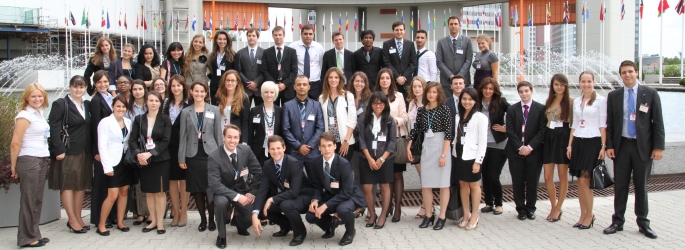Inhalt:
.Model United Nations Club: Guide

Guide: Easy Steps to MUN
For all newcomers: Don't worry! Even if everything sounds very unfamiliar or confusing at first, you will quickly learn all the necessary skills. If there are still any doubts left, don't hesitate to ask us. It is one of our main goals to actively help you to join into the world of diplomacy and we are happy to answer any questions you may have.
1. Introductory Sessions
We often organize special sessions dedicated exclusively for newcomers. For participation at an introductory session no preparation is needed from your side as we will expain you everything. You should only have basic knowledge in english (high school level) as the meetings are always held in english. Of course at side talks and for private communication participants can - as at the "real" UN - use also other languages.
2. Regular Sessions
If you would like to participate at a regular session you should write a short e-mail stating which country position you would like to represent during the next meeting. Please note that you are not allowed to represent the country of your origin. A list of dates of the meetings and all available country positions will be announced at "Vienna". As a single session sometimes consists of two consecutive meetings, make sure you have time on both dates if you choose an important country. Soon after the Organizing Team has received your message, they will confirm your country position for the upcoming session. At that time you should then start with the next step.
3. Preparation
During the meetings each participant has to represent his/her country position as authentic as possible. Therefore, some preparation will be necessary. In order to make the research easier sometimes a short study guide will be published before the first meeting of a new session. The study guide will present the basic facts about the topic. You should also do further research on your country and its position. Therefore, you can find a list of very good research sources at the end of this website. As a checklist you can also use a short nation guide.
On the basis of your research, you could write a short position paper (half to maximum one page, not mandatory for participation). You can use this position paper guide, as well as these position paper samples:
Paper1, Paper2, Paper3, Paper4
MUNs follow certain rules which are similar to the procedures of the UN itself: Rules of Procedure Of course you will not need to learn all of the rules, as it is part of the MC to make you acquainted to the procedures through learing by doing.
4. Participation and Certificate
Due to the highly interactive nature of our sessions, only people interested in active participation can be admitted to our meetings (no audience). In case you would like to earn our valuable certificate you need to actively participate at least in 8 sessions. Participation is for free; however, participants who would like to earn a certificate need to be Member of the AFA Network (annual fee: 25.- Euro). For the Introductory Session a Membership is not required.
5. General Tips for the Simulation
6. Further Research Sources
Newspapers
State Sources - Foreign Ministries
Other Sources